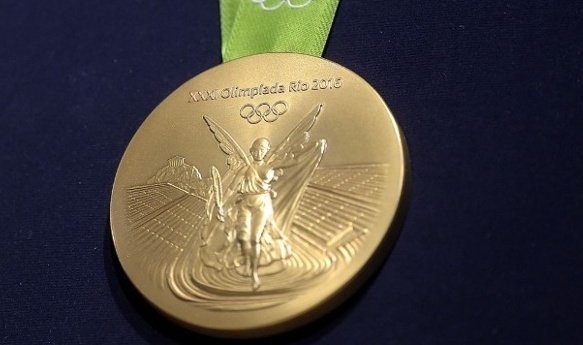當(dāng)前位置: Language Tips> 雙語新聞
Finland tops podium for most Olympic medals won per capita
分享到
里約奧運(yùn)已經(jīng)開幕,各國的觀眾除了選擇自己感興趣的項(xiàng)目看比賽以外,還會(huì)格外關(guān)注自己國家在獎(jiǎng)牌榜上的表現(xiàn)。在最近幾屆夏季奧運(yùn)會(huì)上,中國、美國和俄羅斯一直在前三的位置上爭來爭去,其中,美國奪得第一的次數(shù)最多。

不過,如果我們不看獎(jiǎng)牌總數(shù),而是根據(jù)各國的人均獎(jiǎng)牌數(shù)來排名的話。結(jié)果可能就完全不一樣了。
There are no prizes for knowing that the US has won more Olympic medals than any other country since the first modern summer games were held in 1896.
自1896年第一屆現(xiàn)代夏季奧運(yùn)會(huì)舉辦以來,美國隊(duì)獲得的獎(jiǎng)牌總數(shù)比其他國家都要多。這是人盡皆知的事實(shí)。
Kudos is due, however, to those who are able to name Finland as having won the most medals per Games contested relative to the country’s population size.
而能夠根據(jù)國家人口數(shù)計(jì)算出每屆奧運(yùn)會(huì)的人均獎(jiǎng)牌數(shù),使得芬蘭登上榜首的位置,這就值得說一說了。
To work out how well each country fared, we took the number of medals won by each – in Finland’s case 303 – and divided it by the number of summer Olympics competed in to get the average number of medals won. We then calculated the medal haul against each country’s 2015 population.
要計(jì)算出每個(gè)國家的人均獎(jiǎng)牌數(shù),我們先用每個(gè)國家獲得的獎(jiǎng)牌總數(shù)除以該國參加過的夏季奧運(yùn)會(huì)次數(shù),這樣就得出了該國每次奧運(yùn)會(huì)的平均獎(jiǎng)牌數(shù)。然后,我們?cè)儆眠@個(gè)平均獎(jiǎng)牌數(shù)除以該國2015年的人口總數(shù)。
By this measure the Olympic podium would see Finland – population 5.5 million – receive the gold medal, Estonia the silver and the Bahamas the bronze.
這樣計(jì)算以后,站在奧林匹克領(lǐng)獎(jiǎng)臺(tái)最頂端的是芬蘭(人口550萬),愛沙尼亞和巴哈馬分獲銀牌和銅牌。
Finland’s record is still driven by its early successes. In the five Olympic Games held between Stockholm 1912 and Los Angeles 1932, the country won 148 medals, averaging almost 30 per Games.
芬蘭的獎(jiǎng)牌記錄主要來源于早期奧運(yùn)會(huì)上的成就。在1912年斯德哥爾摩奧運(yùn)會(huì)和1932年洛杉磯奧運(yùn)會(huì)之間的五屆奧運(yùn)會(huì)上,芬蘭總共獲得了148枚獎(jiǎng)牌,平均每屆約30枚。
Part of the success is attributable to the so-called Flying Finns, a group of long distance athletes including Hannes-Kolehmainen, Ville Ritola and Paavo Nurmi.
而芬蘭的這些獎(jiǎng)牌中,有一部分都是像漢內(nèi)斯·科勒赫邁寧、維拉·里托拉以及帕沃·魯米等長跑名將貢獻(xiàn)的,這些人被稱為“飛翔的芬蘭人”。
 |
| 芬蘭長跑名將魯米 |
Nurmi was one of the most successful Olympians of all time. He was one of just four athletes to win nine Olympic gold medals, not to mention three silvers, and the first to win five golds in one Games, in Paris in 1924.
魯米是奧運(yùn)史上最成功的運(yùn)動(dòng)員之一。他是僅有的四位獲得九枚奧運(yùn)金牌的運(yùn)動(dòng)員之一,而且他還得過三枚銀牌。他還是首位在一屆奧運(yùn)會(huì)上獲得五枚金牌的運(yùn)動(dòng)員,那是在1924年的巴黎奧運(yùn)會(huì)上。
Finland has won medals at every summer Olympics since 1908.
自1908年開始,芬蘭在每屆夏季奧運(yùn)會(huì)上都有獎(jiǎng)牌收入囊中。
【考考你】
用上面的算法計(jì)算的話,中國的人均獎(jiǎng)牌數(shù)是多少呢?
英文來源:衛(wèi)報(bào)
(中國日?qǐng)?bào)網(wǎng)英語點(diǎn)津 Helen)
上一篇 : 紐約時(shí)報(bào)將短信直播里約奧運(yùn)
下一篇 : 孫楊400米自由泳摘銀
分享到
關(guān)注和訂閱


關(guān)于我們 | 聯(lián)系方式 | 招聘信息
電話:8610-84883645
傳真:8610-84883500
Email: languagetips@chinadaily.com.cn